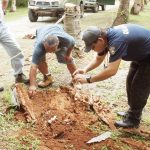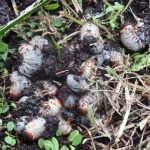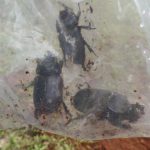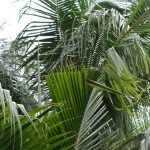Devastating coconut rhino beetles found on Rota
- CNMI Quarantine and Forestry document and seize adult beetles and larvae. (OFFICE OF THE GOVERNOR)
- Larvae of the coconut rhino beetles are collected from a decaying coconut tree. (Contributed Photo)
- Samples of coconut rhino beetles are bagged to be sent to Guam for examination. (Contributed Photo)
- Traces of coconut rhino beetles coconut tree eating patterns. (Contributed Photo)
Rota forester James Manglona reported to acting Lands and Natural Resources secretary Augustin Kaipat last week the discovery of coconut rhinoceros beetles on Rota—a type of beetle that has already decimated swaths of coconut trees in Guam.
According to Manglona, 20 adult beetles and many grubs were found when a coconut tree fell to the ground.
Specimens were collected and sent to Guam for professional review, said CNMI state forester Victor Deleon Guerrero.
The U.S. Department of Agriculture’s Animal and Plant Health Inspection Service has also been notified, said Kaipat.
“Mr. Dallas Berringer of USDA-APHIS had been notified by Rota Quarantine and, so far, we have been instructed to have the specimens of adult and larvae sent to Guam for examination,” Kaipat said.
Berringer said the specimens will be reviewed by a national identifier that will give the legal authority to provide any support for survey, eradication, and control efforts “and we anticipate official species confirmation toward the end of next week,” Kaipat added.
In the meantime, DLNR plans to set up an incident command to manage the response and identify short-term resources that the CNMI can make in the next three months.
Berringer noted that increased trapping must take place to identify potential infestation, an islandwide visual survey for signs of coconut rhinoceros beetle presence must be conducted, and a complete sanitation of the site radiating outwards should be done.
Acting governor Victor B. Hocog warned that coconut rhinoceros beetles, or CRB, are detrimental to coconut palms and agriculture.
“I ask our residents on Rota to report signs or discoveries of the coconut rhinoceros beetle to our CNMI Forestry. Our coconut trees play an important role in our heritage and are so significantly useful. CRB effects are damaging to our small island and containment is needed to eradicate the Rhino Beetles before they spread to other areas,” Hocog said.
To report a sighting, call CNMI Forestry at 256-3321 or Department of Lands and Natural Resources at 322-9834.































